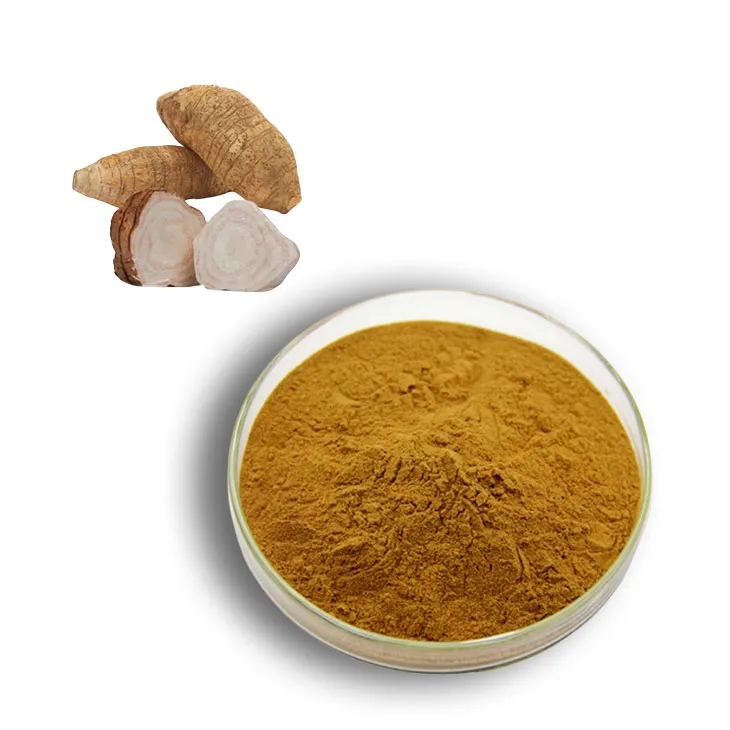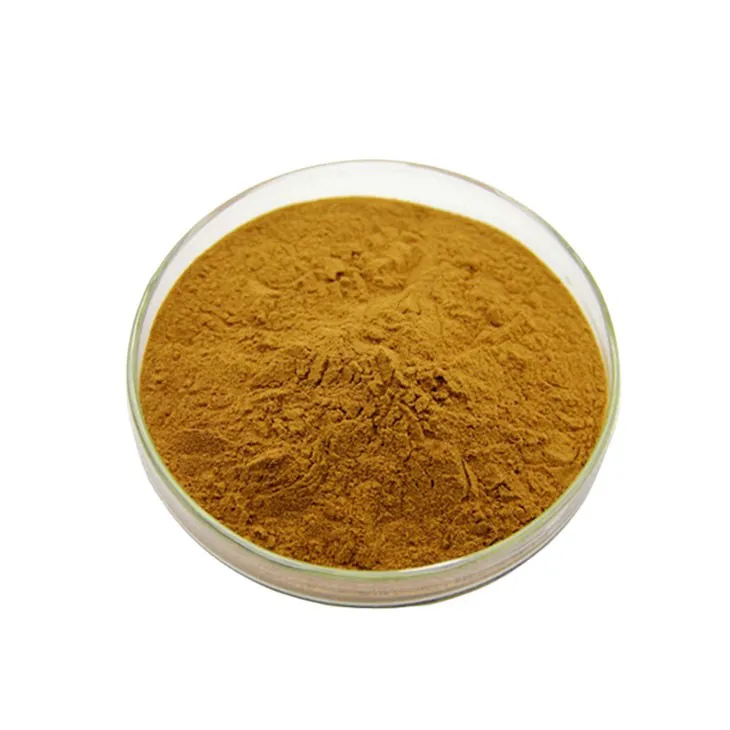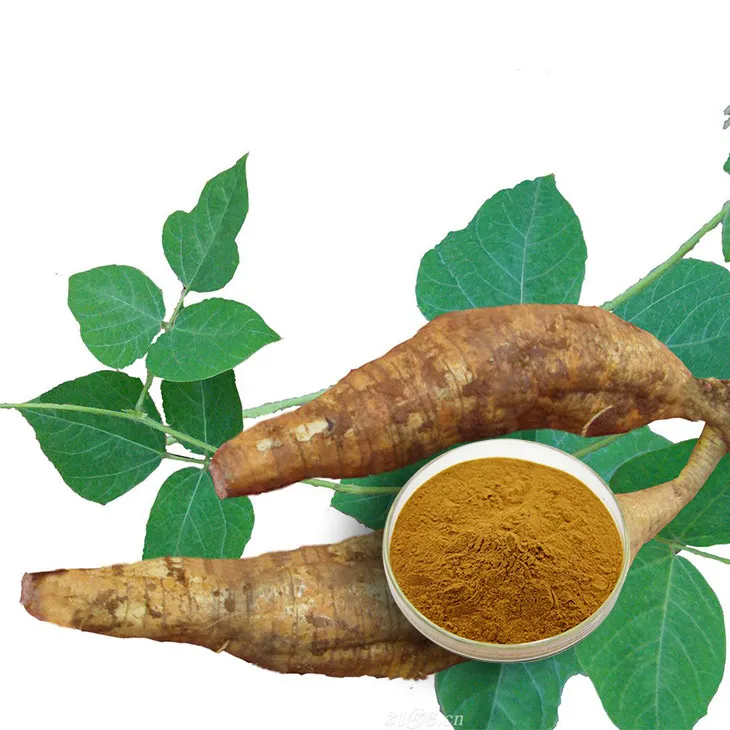- 0086-571-85302990
- sales@greenskybio.com
Five Effects of Pueraria Lobata Extract + Dosage and Side Effects.
2024-11-13

I. Introduction
Pueraria lobata, also known as kudzu, has been used in traditional medicine for centuries. Its extract is becoming increasingly popular in modern health and wellness applications. This article will explore in - depth the five main effects of Pueraria Lobata Extract, its appropriate dosage, and potential side - effects.

II. The Five Effects of Pueraria Lobata Extract
1. Antioxidant Effect
Antioxidants play a crucial role in maintaining health by neutralizing free radicals. Pueraria Lobata Extract is rich in flavonoids and other phenolic compounds, which are powerful antioxidants. These antioxidants can prevent oxidative damage to cells, which is associated with various chronic diseases such as cancer, heart disease, and neurodegenerative disorders.
- Flavonoids like puerarin in the extract can scavenge free radicals directly.
- They also help to boost the body's own antioxidant defense systems, such as increasing the activity of antioxidant enzymes like superoxide dismutase (SOD).
2. Anti - Inflammatory Effect
Inflammation is a natural response of the body to injury or infection, but chronic inflammation can lead to many health problems. Pueraria lobata extract has been shown to possess anti - inflammatory properties.
- It can inhibit the production of pro - inflammatory cytokines, such as interleukin - 1β (IL - 1β) and tumor necrosis factor - α (TNF - α).
- Studies have also demonstrated that it can suppress the activation of inflammatory pathways, like the nuclear factor - κB (NF - κB) pathway.
3. Hypoglycemic Effect
For individuals with diabetes or those at risk of developing diabetes, the hypoglycemic effect of Pueraria lobata extract may be of great significance.
- It can improve insulin sensitivity. This means that cells in the body are better able to respond to insulin, allowing for more efficient glucose uptake from the blood.
- Some components in the extract may also stimulate the pancreas to secrete more insulin, although this effect is still being studied more comprehensively.
4. Cardiovascular Protective Effect
Pueraria lobata extract offers several benefits for cardiovascular health.
- It can help to lower blood pressure. This is achieved through mechanisms such as relaxing blood vessels, which reduces the resistance against blood flow.
- The extract also has lipid - lowering effects. It can reduce levels of LDL cholesterol (the "bad" cholesterol) and triglycerides in the blood, while potentially increasing HDL cholesterol (the "good" cholesterol).
- By reducing oxidative stress and inflammation in the blood vessels, it can also prevent the formation of atherosclerotic plaques, which are a major risk factor for heart attacks and strokes.
5. Hepatoprotective Effect
The liver is a vital organ responsible for many metabolic functions. Pueraria lobata extract has been found to have a hepatoprotective effect.
- It can protect the liver from damage caused by toxins, such as alcohol and certain drugs. This is due to its antioxidant and anti - inflammatory properties, which can reduce oxidative stress and inflammation in the liver.
- Studies have also suggested that it may promote liver cell regeneration, which is important for the recovery of liver function in cases of liver injury.

III. Dosage of Pueraria Lobata Extract
Determining the appropriate dosage of Pueraria lobata extract can be complex as it depends on various factors such as the form of the extract (e.g., powder, capsule, tincture), the intended use, and the individual's health condition.
1. General Dietary Supplement Dosage
When used as a general dietary supplement for antioxidant, anti - inflammatory, or general health promotion purposes:
- For powdered extract, a common dosage range is about 1 - 3 grams per day. This can be divided into two or three doses throughout the day.
- If in capsule form, typically, 1 - 3 capsules per day may be taken, depending on the concentration of the extract in each capsule.
2. Therapeutic Dosage for Specific Conditions
- For hypoglycemic effects in individuals with diabetes or pre - diabetes, higher dosages may be required, but this should be determined under the supervision of a healthcare provider. Initial dosages might start at around 3 - 5 grams per day, with careful monitoring of blood glucose levels.
- In cases of cardiovascular protection, dosages in the range of 2 - 4 grams per day may be considered, especially when combined with other lifestyle modifications and medications as part of a comprehensive treatment plan.
- When aiming for hepatoprotective effects, 2 - 3 grams per day of the extract could be a starting point, but again, medical advice is crucial, especially for individuals with existing liver diseases.

IV. Side Effects of Pueraria Lobata Extract
While Pueraria lobata extract has many potential health benefits, it is also important to be aware of possible side - effects.
1. Gastrointestinal Disturbances
Some people may experience mild gastrointestinal side - effects, such as:
- Nausea: This can occur, especially when starting to take the extract or if the dosage is too high. It is often a transient effect that may subside as the body adjusts to the supplement.
- Diarrhea: In some cases, loose stools may be experienced. This is more likely if the extract is not well - tolerated or if there are underlying gastrointestinal sensitivities.
2. Hormonal Effects
Pueraria lobata contains phytoestrogens, which are plant - based compounds that can have estrogen - like effects in the body.
- For women, there may be concerns about hormonal imbalances. Although the evidence is not conclusive, high - dose or long - term use of the extract may potentially affect the menstrual cycle or hormonal levels in some women.
- In men, there have been some reports, although rare, of potential effects on testosterone levels due to the phytoestrogen content. However, more research is needed to fully understand these effects.
3. Allergic Reactions
Allergic reactions to Pueraria lobata extract are possible, although relatively uncommon.
- Symptoms may include skin rashes, itching, or swelling. In more severe cases, difficulty breathing or anaphylactic shock can occur, but this is extremely rare.
- Those with known allergies to plants in the Fabaceae family (to which Pueraria lobata belongs) are at a higher risk of having an allergic reaction to the extract.
V. Conclusion
Pueraria lobata extract offers a range of potential health benefits, including antioxidant, anti - inflammatory, hypoglycemic, cardiovascular protective, and hepatoprotective effects. However, when using it, it is essential to consider the appropriate dosage based on individual needs and health conditions. Additionally, awareness of possible side - effects, such as gastrointestinal disturbances, hormonal effects, and allergic reactions, is crucial. As with any supplement or herbal remedy, it is advisable to consult a healthcare professional before starting to use Pueraria lobata extract, especially for those with pre - existing medical conditions or who are taking other medications.
FAQ:
Question 1: What are the main effects of Pueraria lobata extract?
The Pueraria lobata extract has several main effects. Firstly, it may have antioxidant properties, which can help combat oxidative stress in the body. Secondly, it might play a role in regulating blood sugar levels, potentially being beneficial for those with diabetes or at risk of developing it. Thirdly, it could have an impact on blood lipid regulation, helping to maintain healthy cholesterol levels. Fourthly, it may possess anti - inflammatory qualities, which can be useful in reducing inflammation in the body. Fifthly, some studies suggest it may have a positive effect on cardiovascular health, perhaps by improving blood vessel function.
Question 2: How should Pueraria lobata extract be dosed?
The appropriate dosage of Pueraria lobata extract can vary depending on several factors such as the intended use, individual's health condition, and the form of the extract (e.g., capsules, powder). In general, when used as a dietary supplement, typical dosages might range from 500 - 1500 mg per day. However, it is crucial to follow the instructions provided on the product label or consult a healthcare professional. They will be able to take into account your specific situation, including any pre - existing medical conditions or medications you are taking, to determine the safest and most effective dosage for you.
Question 3: What are the possible side effects of Pueraria lobata extract?
Although Pueraria lobata extract is generally considered safe for most people when used appropriately, some possible side effects may occur. Gastrointestinal issues such as stomach upset, nausea, or diarrhea can sometimes be reported. In addition, in some cases, it may cause allergic reactions, especially in individuals who are sensitive to plants in the same family. There have also been rare reports of hormonal imbalances, particularly related to its potential effects on estrogen levels, but more research is needed to fully understand this aspect. It is important to discontinue use and seek medical advice if any unusual or adverse symptoms are experienced.
Question 4: Can Pueraria lobata extract interact with medications?
Yes, Pueraria lobata extract may interact with certain medications. For example, if you are taking medications for diabetes to control blood sugar levels, the potential blood - sugar - regulating effect of the extract could lead to hypoglycemia (low blood sugar) if not properly monitored. It may also interact with medications for blood pressure, as its effects on blood vessels could potentially enhance or interfere with the action of these drugs. Additionally, since it may have some hormonal - related effects, it could interact with hormonal medications. Therefore, it is essential to inform your healthcare provider if you are planning to take Pueraria lobata extract, especially if you are on any medications.
Question 5: Is Pueraria lobata extract suitable for everyone?
No, Pueraria lobata extract is not suitable for everyone. Pregnant and breastfeeding women should avoid it as there is not enough research to determine its safety during these periods. People with hormone - sensitive conditions such as certain types of breast cancer should also be cautious, given the potential hormonal effects. Additionally, those with a history of allergic reactions to plants in the same family as Pueraria lobata may be at risk of an allergic reaction to the extract. As always, it is advisable to consult a healthcare professional before starting any new supplement.
Related literature
- The Chemical Constituents and Pharmacological Activities of Pueraria lobata"
- "A Review on the Health Benefits of Pueraria lobata Extract in Metabolic Disorders"
- "Safety and Efficacy of Pueraria lobata Extract: Current Evidence and Future Perspectives"
- ▶ Hesperidin
- ▶ Citrus Bioflavonoids
- ▶ Plant Extract
- ▶ lycopene
- ▶ Diosmin
- ▶ Grape seed extract
- ▶ Sea buckthorn Juice Powder
- ▶ Fruit Juice Powder
- ▶ Hops Extract
- ▶ Artichoke Extract
- ▶ Mushroom extract
- ▶ Astaxanthin
- ▶ Green Tea Extract
- ▶ Curcumin
- ▶ Horse Chestnut Extract
- ▶ Other Product
- ▶ Boswellia Serrata Extract
- ▶ Resveratrol
- ▶ Marigold Extract
- ▶ Grape Leaf Extract
- ▶ New Product
- ▶ Aminolevulinic acid
- ▶ Cranberry Extract
- ▶ Red Yeast Rice
- ▶ Red Wine Extract
-
Shikone Extract
2024-11-13
-
Genistein
2024-11-13
-
Citrus Aurantii Extract
2024-11-13
-
Andrographis Paniculata Extract Powder
2024-11-13
-
Berberis aristata Extract
2024-11-13
-
Chia Seed Powder
2024-11-13
-
Sea buckthorn oil
2024-11-13
-
Dan Shen Root Extract/Salvia Root Extract
2024-11-13
-
Peppermint Extract Powder
2024-11-13
-
Eucommia Ulmoides Extract
2024-11-13





















